Following Paddy Ashdown up the stairs of his Kennington home (I tell him: “I love your house” – because that’s what I do when I go to people’s houses – and he returns smartly: “It’s a flat”), I mistake his publisher for his co-author, Sylvie Young. “She’s not my co-author.” “Sorry, researcher?” “She’s my collaborator.” I say he should shave her head for the book launch. He gives me a look that says, “Now, why would I shave a person’s head?”
It’s quite easy to make a mistake with Lord Ashdown, but he is also a very equable, forgiving man. “I just regard myself as being an exceptionally fortunate person,” he says at one point. “I’ve had the opportunity to have adventures in circumstances that are no longer possible. Britain was just coming out of empire. But I’m also able to live the life that I live now.” It has by any lights been fulfilling: a military career, leadership of the Lib Dems, on to the House of Lords, smattered with the memoirs and books that he writes, he says, “in the corners of my life, on trains, waiting for planes”.
His latest, Game of Spies, is the true story of a fascinating wartime triad: a spy, a traitor and a disarmingly human member of the Gestapo. It is an insistent and sometimes mesmerising read, tugging at your attention when you put it down, based on an extraordinary cache of documents sent to him by a reader of a previous book of his, A Brilliant Little Operation. However, despite this proposed subject matter, most exchanges either begin or end – or both – with Brexit, an event about which he felt, “like everybody else, bereft; a sense of personal bereavement. I knew this was coming, a month before. You entertain hopes at the last moment, it’s always a shock. But we drove back to London over Salisbury Plain, it was one of those lovely June mornings. I turned to [his wife] Jane and I think there were probably tears in my eyes, and said, ‘It’s not our country any more.’”
So begins the prologue of his book, in which he writes that it seems to him “extraordinary that our besieged little country committed so many of its young men and women and so much of its resources to secret and extremely hazardous operations to free the countries of Europe, which we have now chosen not to be part of”. So return his thoughts, to the fact that he is “very, very, very frightened about where we are. There is something really nasty here: I remember saying about three years ago, there is a monster below the placid surface of British politics, and it has bloody well emerged.”

There are times when his misery could not be more trenchant: “Leave aside the fact – which is good – that we don’t have mad militarists who want to go to war, everything else about our age reminds me of the 1930s. The fracture, the disrespect for the business of government, the hatred of the establishment. You see a retreat into isolationism, you see the rise of ugly forces, you see those who lie and make a pattern of lying ... As Goebbels said, if you’re going to tell a lie, tell a big one and tell it often. It’s hard not to think of the [£350m for the NHS] bus. I’m not calling Boris Johnson Goebbels.” Well, except you are. He shakes his head sadly – hyperbole would diminish the seriousness of the situation: “Respect for our country has fallen so much,” he modifies, “and putting Boris Johnson in that position is not best calculated to improve that.”
He isn’t the only person to liken political movements across Europe today to the rise of fascism in the interwar years – sociologists do it all the time, and Andrew Marr said something similar last weekend in the Sunday Times – but Ashdown might be the greatest vexation to the leave side. Especially on Twitter, he pulls no punches (arguably, it is not possible to pull a punch on Twitter), likening the Tory Brexiteers to brownshirts last week, which caused the Daily Mail to call him a “clown who’s wrong about everything”. He waves off this sort of stuff: “I don’t believe you should ever allow yourself to be frightened into timidity for using a metaphor. I’m a writer, I’m not going to be frightened off a metaphor.” He pronounces it “metafer”, like the name of a gun or a private. He still sounds incredibly military, and says that it informs his writing. “Have I been involved in the business of intelligence, one way or another? Yes. Have I been in the special forces? Yes. Have I been in politics? Yes. That gives you certain insights, much as a woman” – a look of discomfort crosses his face, which I must admit I enjoy – “because she’s a woman, could write a piece, and know what a woman’s view of these events would be. I don’t say men can’t do it, but you’re better equipped.” Cheers, dude.
However, he insists that the military is the least interesting thing about his past. “It’s the bit where people love to pigeonhole me – ‘He was in the Royal Marines and the special services.’ Let me ask you this one question: did you know that I’m the only member of parliament elected from the unemployed register? Well, I was.” In 1983, he was on a community programme for the long-term unemployed, working voluntarily as a youth worker, having applied unsuccessfully for 150 jobs. Five years later, he was leader of the Lib Dems. He is not without pride, but he’s generally proud about the right things.
That said, he has a bit of a blindspot about the Lib Dems, against whom he will not hear a word. Nick Clegg is “a vastly underappreciated figure in British politics”, he says, although doesn’t deny calling him “fat, pale and unhealthy”, as Clegg recalled in his recent memoirs. “Yeah, absolutely. He was the person at the front of the campaign. We get on very well together, I like him very much, but I wasn’t about to not tell him something that I felt he ought to know.” He thinks the Lib Dem “resurgence is happening, take a look at the byelection results” and that the party will, long-term, see a “dividend” from having been in the coalition: “We will have a reputation for being able to bear the burdens of government, I never expected that in the short run.” And finally – this is the bit that makes me boggle: “I think history will judge it [2010 to 2015] one of the best periods of government we’ve had in my lifetime, and I don’t think we’ll see another as good for some considerable time.”

Seriously? “I think it did a number of things that were really important.” Like what? “First of all, it restrained the Tories; secondly, it helped the country through a very, very difficult passage by providing a majority government who took some sensible decisions.” Like what? “Thirdly, it was serious about its environmental targets. Most people say that the green deal did a huge amount. Speak to environmentalists.” (I did so at the time, as luck would have it: the deal started off with some ambition, but ended up as a programme of market-driven loans – at 7%, not even that cheap – for people to insulate their homes. A poor household couldn’t afford one, and a richer household would get a much better rate sticking it on their mortgage. Three years into the scheme, only 2,000-3,000 households had taken it up. I don’t want to bore on, but in the interests of a pre-post-truth politics, I feel bound to point out that this was one of the limpest, most pathetic policies in the history of government.)
“Fourthly, did we do everything to close the gap between the rich and the poor? No, but we did some very important things, such as the pupil premium. It was good, sensible, solid government. It didn’t do all the things I would have wanted, but I’m very clear that it was the right thing to do for the country.” His loyalty to the party is absolutely unswerving, but he will, finally, admit: “Do I want to see them recover? Yes. Will I help them recover? Yes. Do I see signs of recovery? Yes. But that isn’t going to be in time to help the people I want to help.”
This is the thinking behind More United, a joint venture with others broadly of his mind such as Martha Lane Fox – which attempts to connect people to politics by some route other than a party. “It has 35,000 members in five weeks, which is not bad, half the size of the Lib Dems.” It has five very broad principles – fair markets, rebooted democracy, a green economy, openness and tolerance, pro-immigration – and its members campaign, with money and by any other means they can think of, to give support to the candidate they think best embodies the ideas. It’s neutral in a party political sense, anyone can join, has a lot in common with Steve Hilton’s Crowdpac and relies ultimately on open primaries, in which non-affiliated voters can choose a candidate.
There are politicians who remain profoundly opposed to this idea, most of them in the Labour party, and whose furthest concession to a possible progressive alliance is that the Greens, the Lib Dems and Labour might cut some electoral deals between constituencies. “Been there, done that,” says Ashdown. “It turns friends into enemies, it exhausts and uses up vast amounts of political capital. And by the way, politicians aren’t even believed. If the centre-left says, ‘Do this’, the people will say, ‘Fuck off’.” He thinks, and he’s by no means alone in this, that political parties have come unshackled from the movements that gave them legitimacy and energy. “You can’t have a public that doesn’t feel represented by the political parties, they will react. So they either take over, Trump or Corbyn, a political party, move in and occupy it. Or they form their own political parties, Ukip is an example, Marine Le Pen, the Greens in a way.”
The question he’s trying to answer now is: “Why do movements always have to be for horrible things?” and, on the heels of that, how to organise those on the left – environmentalists, liberals, “sensible Labour”, in his winning phrase. “In the past, if you wanted to get the left together you had to accept the single dominant polarity, which was Labour. Especially with Blair, it meant doing that kind of deal, top-down by the way. Now the left is so fractured, so broken, so diverse, so pluralist. How do you assemble the pieces to make an effective centre-left political force possible?”
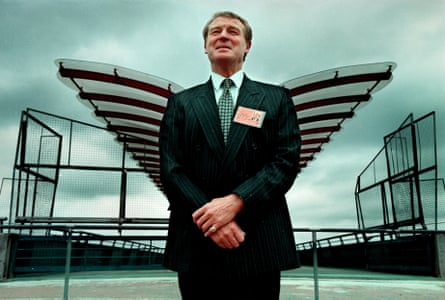
Although he had never entertained the idea of retiring, it seems as though he did think his days in the political fray were over. Having written two volumes of memoirs at the start of the century, he gave up the discipline of keeping a diary. “I should have kept one during the referendum. I didn’t expect to find myself doing anything interesting.” His sadness over the result is tinged, like all great regrets, with self-criticism. “It’s not generally known, but about four weeks before the referendum debate, I was so worried that we were going to lose, I went to see John Major, I went to see Gordon Brown, I went to see George Robertson. Major was really impressive and Gordon did his Gordon best, but that wasn’t the issue. The strategy was wrong. I said: ‘Listen, the only way that we’re going to win this is if the heavyweights get together and tell them that they’re going to lose. Each of us played our individual parts, but we didn’t get together to turn the campaign.”
It is perhaps in this glimpse of his sense of failure that you recognise his great success. Disappointment cannot wither him – not his party’s first bite of government turning sour, not its minuscule remains, not the end of British internationalism, not the slog of rebuilding tolerance and generosity as political ideals, not the fact that his foes on social media still call him Paddy Pantsdown. His resilience is all the more impressive for the fact that he doesn’t so much swing between as simultaneously occupy positions of intense pessimism and wild optimism. One minute he’s quoting Yeats’s The Second Coming as a current-affairs commentary (“The blood-dimmed tide is loosed, and everywhere / The ceremony of innocence is drowned; / The best lack all conviction, while the worst / Are full of passionate intensity”, and I must admit, the last line brings an unbidden and wholly unwelcome image of James Delingpole flashing before my eyes). And yet he concludes with unalloyed optimism. “I am certain that decency and the forces of good will triumph. When, I don’t know. But that it will happen, I am absolutely clear.”
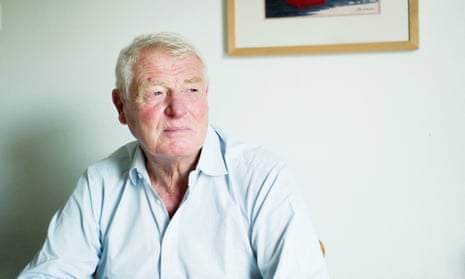



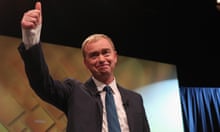
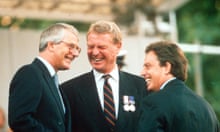


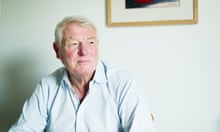
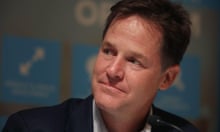
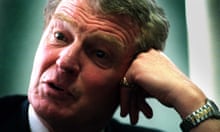
Comments (…)
Sign in or create your Guardian account to join the discussion